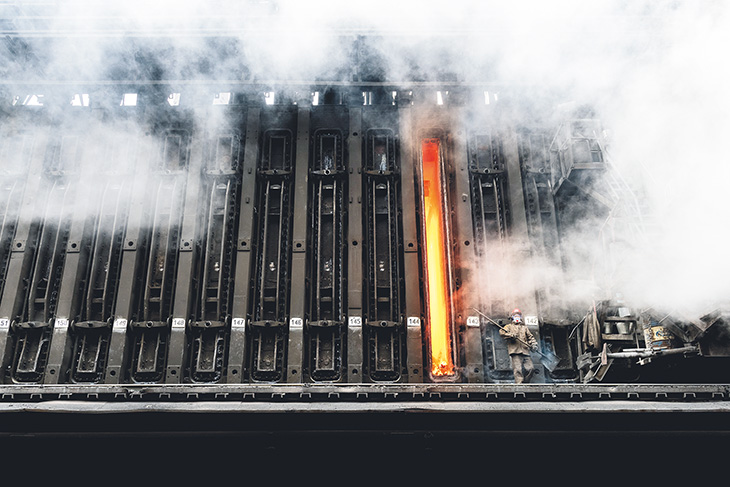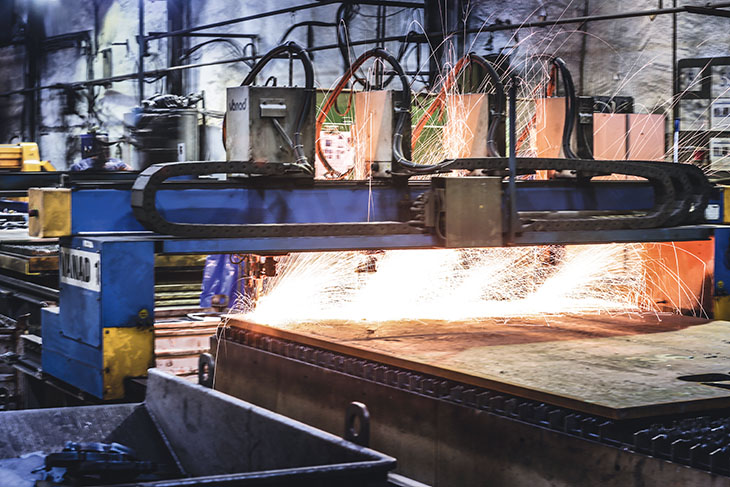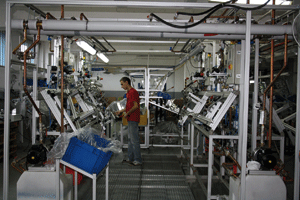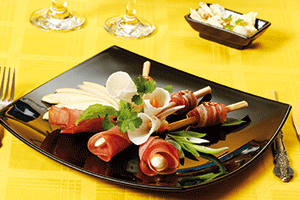MMK is one of the world’s largest steel producers. The company’s operations in Russia include a large steel producing complex encompassing the entire production chain, from preparation of iron ore to downstream processing of rolled steel.
MMK turns out a broad range of steel products with a predominant share of high-value-added products.
Flagship of the country’s iron
and steel industry
The history of MMK begins in 1932. The first cast iron at the plant was mined on February 1, 1932. In July of the following year, the first open-hearth furnace was completed, and in four years the open-hearth shop of the enterprise had 12 furnaces. During WWII, MMK turned into a steel bulwark for the country. Every third shell and every second tank armour were made from Magnitogorsk steel. In the later Soviet years, the plant continued to expand its production. The new page of the company’s history was the launch in 1990 of the oxygen-converter shop, which marked the beginning of the transition to new, more environmentally friendly methods of steel production. In 2017, the shop overcame an important symbolic milestone of 200 million tons of steel produced. To date, it is one of the most productive shops in the world among analogues. Since the beginning of the 2000s, the company has invested over $ 13 billion in the development of production facilities. In particular, a large-scale reconstruction of the steelmaking facilities was completed with a complete transition to continuous casting of steel, a complex for the production of thick-gauge rolled steel was built, and a universal complex of cold rolling (mill 2000), designed to produce high-quality automobile body sheets and metal products for producers of household techniques was launched. In 2002 the company produced 100 thousand tons of galvanized steel per year, and by 2017 it began to produce the same volume monthly. In July a new continuous hot dip galvanizing unit was opened, which allowed to increase MMK’s capacity for galvanizing. In the field of financial management, the company is steadily moving in the direction of increasing transparency and compliance with the best world practices. In 2007, it successfully located on the London Stock Exchange. The market value of MMK has increased by more than 200% in the last two years. In accordance with the company’s new dividend policy, about 50% of free cash flow is directed to the corresponding dividends. One of MMK’s recent management initiatives is the payment of dividends in a quarterly rhythm: in accordance with the best global corporate practices. At the moment, Magnitogorsk Metallurgical Combine is one of the recognized leaders of Russian and world metallurgy. The company ranks first in the Russian market of rolled metal with a market share of more than 18%. In the world rating of metallurgical companies, compiled by the influential international organization World Steel Association, the plant takes 31st place. In 2016, MMK Group produced 12.5 million tonnes of steel and the company’s revenue reached $ 5.6 billion.
Main products and manufacturing process
The product line of the company is constantly expanding. It can be conditionally divided into three large groups: hot-rolled steel, cold-rolled steel and graded products. In general, MMK currently accounts for 40% of the Russian zinc market, 33% of the hot-rolled steel market and 30% of the cold-rolled steel market. MMK, being an enterprise of a full metallurgical cycle, has the production of open-cast mining, the enrichment of iron ores, agglomeration, coke-chemical, blast-furnace, steelmaking, the production of hot sheet and long products, the production of cold rolled products, rolled products with zinc and polymer coating. The first redistribution of metallurgical production at MMK is agglomeration. Its main product is agglomerate. In MMK, the agglomerate is obtained from 3 sinter plants.Coke production is also one of the key components of the first redistribution of metallurgical production. MMK coke-chemical production is the largest enterprise in Russia for the production of coke both in terms of installed capacities and in terms of production volume. Domain production is the key in the metallurgical industry and in the formation of the cost of the final product. The main product of blast furnace production is pig iron. At MMK, cast iron produces 8 blast furnaces with a total volume of 12,261 cubic meters. Steel smelting at MMK is carried out in two shops: oxygen-converter and electric steelmaking. Rolling production at MMK is considered the final stage in the production. The complex of modern rolling mills of various characteristics allows the company one of the widest product line among all Russian metallurgical companies. Rolling shops of MMK produce two main types of rolled products - sheet and high-grade. MMK’s rolling products are used not only for large manufacturers of heavy industry, but also for the production of coins of the Central Bank of the Russian Federation and consumer goods.
New investments
In accordance with the MMK Group’s strategy, up to 2025, capital investments are planned to be maintained in the range of 0.4-0.6 billion US dollars per year (including maintenance costs at the level of 0.2-0.25 billion US dollars), depending on the ruble exchange rate. When implementing the investment program, capital investments will be carried out to maintain fixed assets with an emphasis on updating the first redistribution, which will further reduce the cost of production while increasing the quality of products. Among the key investment projects is the construction of a new sinter plant. In November 2016, a contract was signed with Sinosteel Equipment & Engineering Co., Ltd. (PRC) for the supply of equipment for the new sinter plant No. 5. The cost of this project, including construction and installation works, will be about 22 billion rubles. A new sinter plant with a capacity of at least 5 million tons of blast furnace feedstock per year should be put into operation in 2019. In 2019-2021, MMK plans to build a new coke oven battery that will replace batteries No. 1 and No. 2. The estimated cost of the project is $ 300 million. It will help to improve the quality of coke and reduce the environmental load. Another ambitious project of the company is the construction of a new blast furnace in 2022-2024, which will help increase the output of pig iron, reduce costs and technogenic impact on the environment. Approximate volume of capital investments is 550 million dollars.
Export and financial results
The domestic market remains the priority market for MMK. By the end of 2016, 73% of the products were delivered to the domestic market. At the same time, the company’s products are in high demand abroad. Among the consumers of Magnitogorsk metallurgical plant products are Europe, Asia and the Middle East. The net profit of MMK Group in 2016 exceeded $ 1 billion, which is more than 2.5 times higher than the level of the previous year. The EBITDA margin was 34.7%, remaining at the highest level since 2007. Free cash flow amounted to $ 728 million. The company continues to implement a conservative financial policy and focuses on the regular return of returns to shareholders. In October 2017, Forbes magazine presented a global list of the best employers, which included 500 of the world’s leading companies. MMK was 214th in this the rating. To date, the salary in the company is the highest in Magnitogorsk. MMK’s spending on social projects is also traditionally kept at a high level and growing. For the first six months of this year, the plant spent 670 million rubles on social programs. It’s 14% more than in the previous year. In general, the company spends about 1.5 billion rubles annually for charity and social programs, including support for pensioners, school establishments and employees’ health improvement.
Further development plans
In the coming years, the priority areas of company’s activity are the development and improvement of the quality of interaction with customers and enhancing the operational and functional efficiency of the business. Among the priorities is the further growth of the company’s sustainability through the enhancement of labor safety, the development of personnel and the strengthening of partnership relations. In the new economic situation, low-cost companies receive a competitive advantage. And, despite the fact that MMK is already among the global leaders of low-cost production, in order to retain competitive positions, the company continues to increase operational and functional efficiency by introducing lean manufacturing tools, improving the accounting of material flows, ensuring timely deliveries with minimization of stock. Particular attention is paid to modeling and mathematical optimization of key processes .In 2016, MMK Energy Policy was approved and put into operation. According to this document, the strategic goal in the field of energy conservation and energy efficiency improvement is to reduce the cost of energy resources in the cost of production. Achievement of this goal will be ensured by improving management efficiency, motivating and involving staff, introducing advanced technologies into practice. MMK continues to invest in the implementation of rapidly recoverable and low-cost energy-saving initiatives, whose budget in 2016 increased to 1.2 billion rubles. To improve the environmental performance of the company in 2015, the Clean City initiative was developed, which should ensure a low level of atmospheric pollution in Magnitogorsk by 2025. The total investment of the company in environmental activities until 2025 is planned at more than 35 billion rubles.























